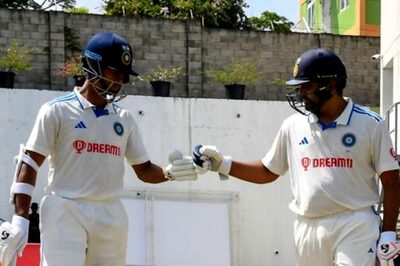
views
New Delhi: Home Minister Amit Shah on Wednesday said the situation in Jammu and Kashmir was normal and internet services would be restored in the Valley “at an appropriate time”.
Amit Shah was responding to a number of questions asked by many Rajya Sabha members including Congress leader and former Chief Minister of Jammu and Kashmir, Ghulam Nabi Azad, on the issue of restrictions, and the state of health and education in Jammu and Kashmir.
On the restoration of internet services, Shah said facilities will be restored "at an appropriate time by the authorities there. As we all know our neighbouring country [Pakistan] also is carrying out various covert activities there and only after taking into consideration the law and order, can a decision on this be arrived at."
Azad challenged the logic cited by Shah and remarked that Pakistan has been India's neighbour since 1947, since when India has also fought wars against it. If this were the case, Azad implied, then internet would never be restored in the valley.
This prompted Shah to say, "I agree that internet is quite essential for information and it should be restored as soon as possible. But let me remind him that mobile phones were introduced in India in around 1995, and Kashmir got mobile phones for the first time in 2003 by the then BJP government. Internet was also introduced in the valley only in 2002, due to security reasons. Internet is an essential facility but when the question is about security and law and order, I think we to understand our priorities."
Shah also cited a number of figures of healthcare facilities, school examination attendance, polling percentage in recently held Block Development Council polls, and of the landlines and mobile phones restored to argue that situation in Kashmir was 'normal'.
"Out of 316 Block Development Councils elections were successfully held in 307 BDCs with a polling percentage of 98.3%. These elections were conducted in at atmosphere free of fear, "Shah said.
"The medicines are available to Kashmiris in ample supply. Hospitals and mobile vans are stocked fully. In Srinagar in September this year 7.66 lakh people checked into the OPD. While in October [a month after restrictions were enforced in the valley] the number of OPD patients increased to 7.91 lakh. So there is no let-up in healthcare facilities."
He added that not one person had been killed in police firing in the valley since August 5, when Article 370 was effectively scrapped. "Stone throwing incidents have also reduced from 802 incidents last year to 544 this year.”
“All 20,411 schools are open in Kashmir. In recently held 11th class examinations 99.48% students appeared. And in recently held 10th and 12th class examinations 99.7% students appeared for examination," Shah said.
Azad had pointed out that the number of students appearing in schools and colleges during routine class was between zero and five percent only.
"The sale of essentials like petrol, disel, kerosene, LPG and rice has increased between eight to 16 percent in the valley. As far as apple production is concerned, this season a total of 22.58 lakh metric tons of apple produce is expected of which NAFED has already bought 6 lakh metric tons. All 93,247 landline connections have been restored. All 59 lakh mobile phone connections have been restored. In 10 distrits 280 e-terminals have been set up for internet. Urdu and English newspapers are working as usual. Banking is functioning smoothly. Shops are open throughout the day, except at noon. And High Court has dealt with 52,000 cases since August 5," Shah said.
He also reiterated that no deaths have taken place due to police firing. "We heard leaders saying that there would be blood bath on the streets of Srinagar but nothing of this sort happened. I am happy that not one person has died due to police firing," the Home Minister said.
The Narendra Modi government had on August 5 ended Jammu and Kashmir's special status and split it into two union territories — Jammu and Kashmir, and Ladakh after blanketing the region with security personnel and putting
Hours before the Centre announced the decision to scrap Article 370 of the Constitution, telephone and internet services were suspended and public movements restricted. Though postpaid mobile phone connections and landline services have been restored, there is no internet.
Most of the top level and second rung separatist leaders have been taken into preventive custody, while mainstream leaders including two former chief ministers — Omar Abdullah and Mehbooba Mufti — have been either detained or placed under house arrest.
The government has detained former chief minister and sitting Lok Sabha MP from Srinagar Farooq Abdullah under the controversial Public Safety Act, a law enacted by his father and National Conference founder Sheikh Mohammad Abdullah in 1978 when he was the chief minister.




















Comments
0 comment